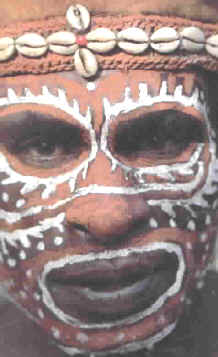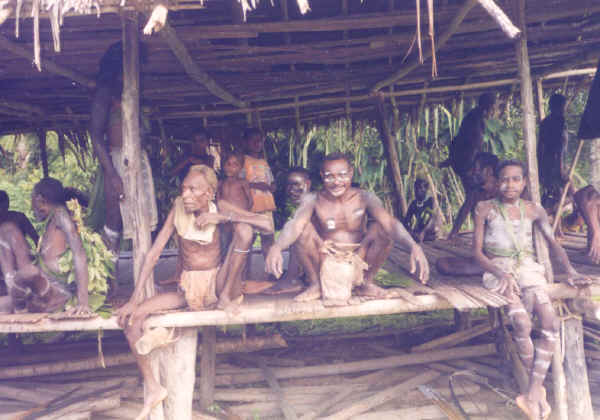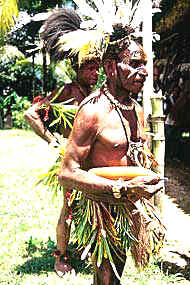| Gift
Exchange.- Amongst natives, except on specific trading occasions, buying and selling does not exist. A gift is made, but it
is incumbent on the recipient to return one of equal or of greater value. This return is expected. Through contact will] the European, however, the
system is being modified, particularly between European and Native, when straight
out barter or sale is made.
Native law and custom sanction this gift
exchange, and, if reciprocation is not made within a reasonable time, the donor considers himself defrauded. A native, therefore, cannot deny a debt
on the plea that what he received was a gift, even though he claims that
he did not ask for it, He is merely trying to convert both systems -
European and Native - to his own advantage.
 |
A
boil, Bubo or swelling in the groin is, in
most cases, ascribed, by the native, to walking over a spot where
someone has recently micturated (urinated).
Pregnancy It is a universal belief that pregnancy will not result from a single act of intercourse.
Coition must be frequent enough for the male to supply sufficient
semen to form the body of the embryo.
MUN and SANDE.-
It is the practice among many labourers to
form groups awl pool their monthly wages, each taking the pool in turn. This is MUN.
Weekly issue of tobacco treated similarly is called SANDE; MIPELA
I MUN and MIPELA I SANDE.
<<< New
Guinea native in ceremonial paint |
The SOUL.- It
is generally believed that, in sleep, the spirit leaves the body and wanders,
abroad. It may have encounters with other spirits or gain knowledge on
these 'wanderings. A dream (diriman) is the consciousness of these
wanderings of the spirit. A native will not awaken a sleeper abruptly,
lest the spirit not have sufficient time to return to the body,
In death. the spirit permanently leaves the body and wanders in or
inhabits the homeland of the deceased. In many tribes it is believed that,
if the mortuary rites are properly carried out and the spirit properly
propitiated, it will ward off other evil influences from the deceased's
family or, at least, not be malign. It is averred that sometimes are heard
after a death. They indicate their presence by low whistles in the
darkness. This is generally the case if member (of the deceased's family
is guilty of some wrong or has a religious tambu.
 |
|
In PNG there is
much sharing of living space. It is very tribal. |
SORCERY and LOVE
SPELLS.- MALIRA, PAPAIT, and POISIN (see dictionary) depend for their success oil the fact that the victim is aware that they have been performed. A man or woman who is the victim of MALIRA, of PAPAIT or of sorcery, firmly believes that he, or she, is powerless against its influence. They seriously tender evidence of MALIRA or PAPAIT as a defence in cases of adultery. Legally this fails, however, as British law takes no cognizance of sorcery or magic. Belief in sorcery or magic is very strong, but it is admitted that it is generally powerless against Europeans because "IM I NARAKAIN." You will waste your time if you endeavour to demonstrate to a native the falseness and foolishness of sorcery. Failure to work is no evidence against sorcery, because it can always be explained away by presuming a fault in procedure, violation of a tambu by the sorcerer or by the presence of stronger, protective magic.
 |
The SPIRIT
WORLD.- The spirit world is inhabited by
Dewel, Tambaran, Masahii. A Dewel is a deceased's spirit and may be malign or tutelary depending on whether it is shown proper
respect or on whether the mortuary rites have been performed properly
and no one has broken the mortuary tambus. Its abode is fixed to the area in which the death that released it occurred.
A Tambaran is a spirit or ghost which inhabits specific areas. They may be
inoffensive - or they may have special functions such as bringing good
crops, warding off sickness, revenging broken tambus or punishing evildoers.
They must be shown proper respect and be properly
propitiated if they are to perform their functions or to refrain from
bringing ill-luck. They are not malign in themselves, but become so
through man's negligence or misconduct. |
They are a great standby,
in native communities, for keeping the women in their place. Some Tambarans have special functions at rites and ceremonies,
particularly initiation ceremonies. A Hasalai is a demon or evil spirit and
inhabits some special place such as a mountain or swamp which is known as a "ples Masalai." He is essentially evil towards all men
and women who enter his domain.
There is no chief spirit governing the spirit world, but in some places a spirit may be singled out as possessing greater powers, or powers relating to the more important events in native life, or as being more terrible if offended. |